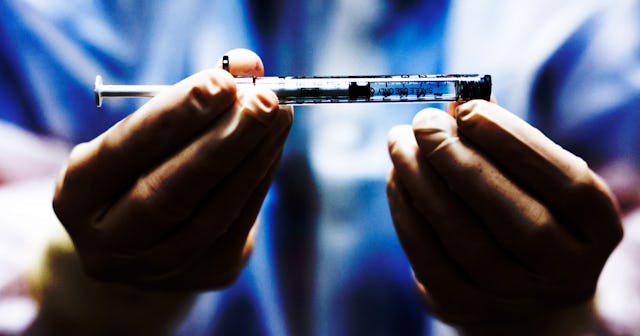If You’re Afraid Of The Vaccine, But Not COVID-19—We Need to Talk

It was too rushed.
I’m not letting my kids be guinea pigs.
We don’t know enough about the side effects yet.
These are all concerns I’ve heard or read about the COVID-19 vaccine in the last several months. As a health reporter for nearly 8 years now, I try really hard to remain open to people’s fears and misconceptions when it comes to the medical field. I even understand where many of those fears and misconceptions come from, as I was once pretty distrustful myself.
Over a decade ago, I became one of the “rare victims” of a medical procedure I had been told by doctors was completely safe. I donated my eggs in college, and quickly lost my fertility (as well as years of my life to multiple surgeries and pain) as a result.
It was only after the fact that I learned there were exactly zero studies into the potential long-term complications of egg donation on otherwise young, healthy donors. And that the industry I had fallen prey to collected a hefty payday as a result of my naivety before swiftly turning its back on me.
So yes, I was distrustful—especially after my daughter was born. I was even what some might call a “vaccine-hesitant mom,” ultimately opting for an extended vaccine schedule for my little girl because I was so full of fear.
Thankfully, my daughter’s pediatrician was patient with me, always open to having conversations about my concerns and treating me like the educated adult I was, constantly pointing me in the direction of science and facts to help answer the many questions I had. And eventually, I came to learn that my fears surrounding vaccines, especially, were just that: fears. Not fact-based, but rather fueled by emotion.
Over the years, I’ve had the opportunity to interview countless medical practitioners and epidemiologists, digging deep into the science and data and realizing how unfounded my fears truly were.
Justin Tallis/Getty
But having been there, having experienced something personally devastating that colored my view of anything even medically adjacent for years, I understand what a powerful motivator fear can be. And I get how that fear can convince some parents that doing nothing is better than doing something they don’t understand.
So I try to listen, I try to learn, and I try to assuage fears when I can.
Which is exactly what I’ve been doing with the COVID-19 vaccine, attempting to share as much relevant information as possible with those who want to learn.
For instance, did you know the vaccine wasn’t actually rushed at all? Instead, it was built upon 20 years of prior research, simply moved to the front of the line when the current threat came to light.
Like all vaccines, it has also gone through rigorous safety testing, with the most concerning potential side effect being allergic reaction—something that can be quickly treated and has already been integrated into the vaccination protocol, with recipients being asked to remain at the medical facility they are vaccinated at for a period of time post-vaccination in order to monitor for any adverse reactions.
As far as long-term side effects, it’s important for people to understand that modern day vaccinations are designed based on what we already know to be safe. Vaccines are tested more than any other form of medication in the world. Known side effects are typically mild and temporary. And many of the potential links the anti-vax crowd screams about (autoimmune diseases, for instance) have been ruled out by way of numerous studies.
Meanwhile, several of the diseases vaccines protect against are known to trigger and worsen autoimmune diseases.
That’s why we have to be willing to look at the potential side effects of the disease if we’re going to talk about (and live in fear of) potential side effects of the vaccine.
In the case of COVID-19, the mounting evidence of long-term damage resulting from the disease is devastating—and far more concerning than anything ever scientifically linked to a vaccine.
To date, doctors have linked the following to COVID-19 infections:
- Multisystem Inflammatory Syndrome (MIS-C)
- Acute Respiratory Distress Syndrome (ARDS)
- Pneumonia
- Blood clots
- Pulmonary embolism
- Septic shock
- Chronic fatigue
- Kidney failure
Many of these long-term impacts are life-threatening. COVID-19 patients have also experienced amputations and multiorgan failure.
And none of this takes into consideration the patients who die early on from the disease itself.
Let there be no mistake: contracting the disease is far more dangerous than the vaccine could ever be. While there is a small population of people who should not be vaccinated for health reasons (and they, and their doctors, know who they are), the rest of us should be running to get in line as soon as the vaccine is made available to us.
Anything else is just living in unsubstantiated fear. And in this case, that fear could actually kill.
Information about COVID-19 is rapidly changing, and Scary Mommy is committed to providing the most recent data in our coverage. With news being updated so frequently, some of the information in this story may have changed after publication. For this reason, we are encouraging readers to use online resources from local public health departments, the Centers for Disease Control, and the World Health Organization to remain as informed as possible.
This article was originally published on